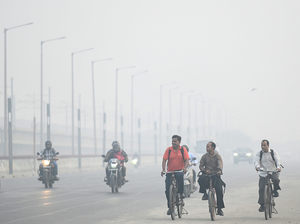
New Delhi: As the Commission for Air Quality Management (CAQM) implements the Graded Response Action Plan (GRAP-III) in Delhi-NCR starting today, truck drivers in the region are expressing worries about the potential effects on their livelihoods.
With restrictions now in place on the movement of BS-III petrol and BS-IV diesel vehicles in Delhi and nearby areas, many drivers fear they may face financial difficulties, including challenges in repaying loans for their vehicles.
The CAQM activated Stage III of the GRAP at 8 a.m. on November 15 in response to the deteriorating air quality in Delhi-NCR. The Air Quality Index (AQI) has surged to 424, categorizing it as “Very Poor.”
The CAQM’s Sub-Committee convened to evaluate the air quality situation, noting that adverse weather conditions, such as dense fog and north-westerly winds, have trapped pollutants, keeping AQI levels dangerously high.
The AQI has remained around 425 since early morning, with little improvement expected soon, as forecasts indicate that air quality will stay at the upper end of the “Very Poor” category.
Stage III of GRAP, which addresses “Severe” air quality with AQI levels between 401 and 450, will enforce strict measures across the National Capital Region (NCR). These include increased mechanized road sweeping and water sprinkling to combat dust pollution.
Authorities will also manage construction and demolition (C&D) activities more effectively, banning high-dust generating tasks like excavation and demolition, as well as restricting road construction and material transport during this period.
Public transport services will be enhanced to provide alternatives to private vehicle use, with incentives like differential fare rates to encourage off-peak travel. Restrictions will also be placed on vehicles that do not comply with the latest emission standards, including BS-III petrol and BS-IV diesel vehicles, along with certain medium and light commercial vehicles (LCVs).
Moreover, operations of stone crushers and mining activities will be halted across NCR to reduce particulate matter in the air.
Alongside these measures, the CAQM is urging citizens to adopt cleaner, more sustainable practices. Residents are encouraged to walk or cycle for short distances, share rides, or use public transport. Those who can work from home are advised to do so.
The CAQM also recommends using electric heaters instead of coal or wood for heating and suggests minimizing unnecessary trips and combining errands to lower overall emissions.
This year, the decision to activate Stage-III of GRAP was made later than in 2023, when it was implemented as early as November 2, highlighting the persistent challenges of air pollution during the winter months.
